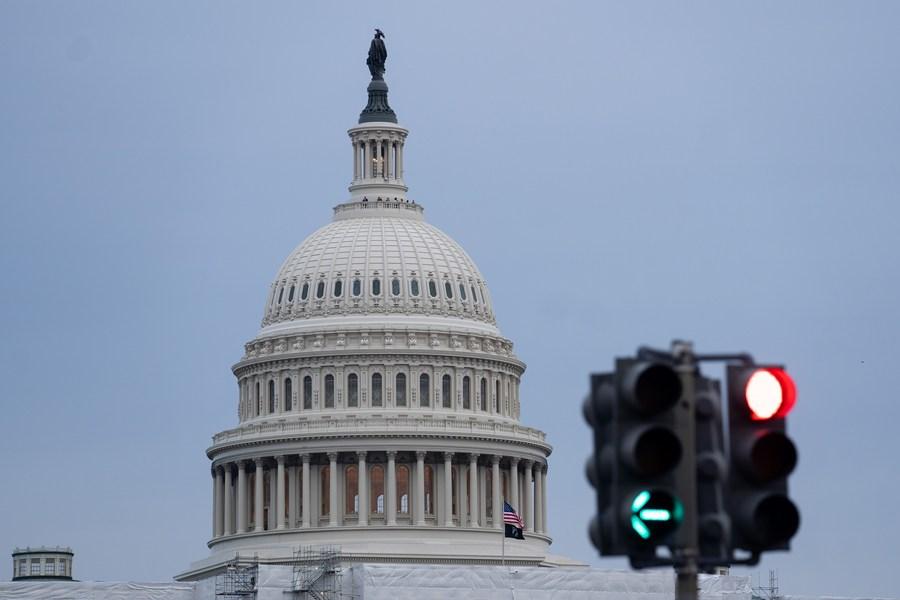
This photo taken on Dec 8, 2022 shows the US Capitol building in Washington, DC, the United States. [Photo/Xinhua]
By Liu Qiang
Twenty-nine nations, including some European countries, have joined the United States in the biennial Rim of the Pacific (RIMPAC) exercise, the world's largest maritime warfare exercise, which began around Hawaii on June 26 and will conclude on Aug 2. An imaginary target of the exercise is China, with some of the drills targeting Chinese-style military operations.
In today's extremely complex and volatile international situation, such self-interest-driven military exercises by the US and its allies raise regional tensions and demonstrate the US-led West's intention of interfering in China's internal affairs.
RIMPAC 2024 reflects the Cold War mentality. It is planned as strategic deterrence, which is a core element of the Cold War mentality, characterized by extreme opposition based on ideology, national and military security, and classifying countries into either friend or foe.
Western countries, especially the US, adhere to value-based diplomacy and have divided the world into a "democratic camp" and an "authoritarian camp", and view China as their biggest security challenge and strategic competitor. The participation of non-Pacific countries in RIMPAC 2024 reflects such an ideological alignment under the US' leadership.
Making China a hypothetical adversary and conducting drills to sink the decommissioned USS Tarawa amphibious assault ship as a target is intended as clear strategic deterrence against China. RIMPAC 2024, themed "Partners: Integrated and Prepared", coincides with Beijing's announcement of military exercises around Taiwan island and thus indicates an attempt to interfere in China's internal affairs.
Since the launch of reform and opening-up, China has pursued the path of peaceful development, striving to promote global harmony and mutual development, which has helped it become the world's second-largest economy and the largest contributor to global economic growth. Yet the US believes China is pursuing development to seek global hegemony and replace the US as world leader.
Therefore, to check China's rise, the US has launched a trade war against China, criticizes China's governance system, and is using strategic deterrence against China, especially in the Taiwan Strait and the South China Sea, where the US continuously flexes its military muscles.
Worse, the US has promised to help defend Taiwan, thereby interfering in China's internal affairs and disrupting its national reunification process. The fact that US President Joe Biden has not ruled out the use of military force in the Taiwan Strait makes RIMPAC a demonstration of US hegemony.
But despite being seemingly formidable, RIMPAC 2024 will not be able to shake China's confidence in peaceful development. Although the exercise is being held far from the Chinese mainland, the choice of the Hawaii region is aimed at island-based combat training. Plus, the timing of the naval drills and the use of the Taiwan card by the US have turned RIMPAC 2024 into a muscle-flexing exercise. But China will not be frightened by such strategic deterrence.
While the joint maritime exercises pose no real threat to China's national security but please the US' vanity, they remind China that it faces significant security challenges and therefore it must continue to bolster its national strength so as to continue following the path of peaceful development and realize national reunification.
Those participating in RIMPAC 2024 include Western countries, developing countries and China's neighboring countries. The combined task force commander of RIMPAC 2024 is an American and the deputy commander Japanese, demonstrating the formation of a strong US-Japan alliance against China.
In recent years, Japan, with the support and encouragement of the US, has overcome constitutional and regulatory constraints to strengthen its militarily alliance with the US and frequently hyped up the "China threat" theory. In fact, Japan has upgraded the actual combat level with the US, making their imaginary enemy less ambiguous.
Also noteworthy is the Philippines' participation in RIMPAC 2024. As an ally, the Philippines has provided nine military bases to the US and taken part in joint military exercises with the US. During the Balikatan 2024 joint exercises in April, the Philippines used an old Chinese-built ship as a target, sinking the ship with a cache of arms and equipment.
Choosing sides is an open choice, but relying on a powerful ally to contain China may be an unwise decision. As such, countries should guard against being used as a disposable tool.
The author is director of the Academic Council and a senior research fellow at the Shanghai Center for RimPac Strategic and International Studies.

 中文
中文



